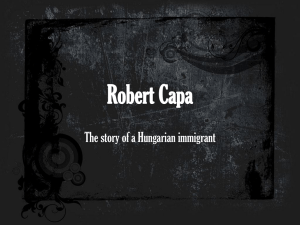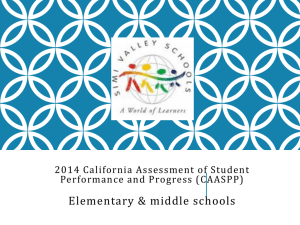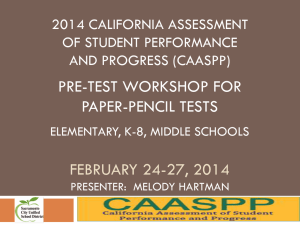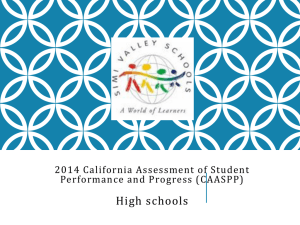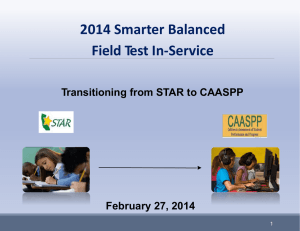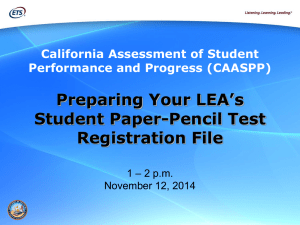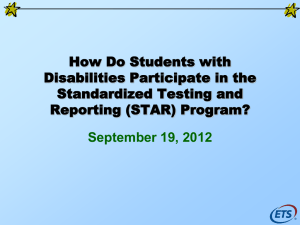2014 CAPA Train-the-Trainer Workshop
advertisement
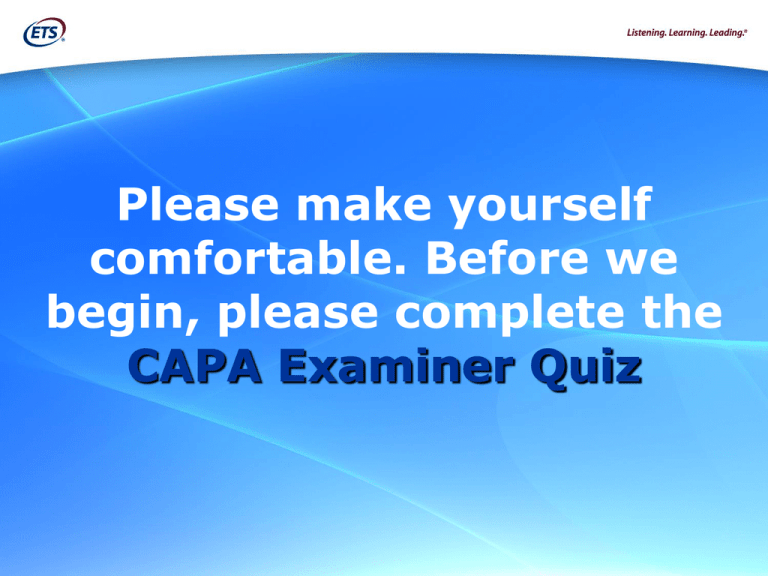
Please make yourself comfortable. Before we begin, please complete the CAPA Examiner Quiz California Alternate Performance Assessment (CAPA) Train-the-Trainer Workshop: Training CAPA Examiners Objectives Participants will train examiners to accurately and consistently: – – – – 3 Prepare for the CAPA Administer the CAPA Score the CAPA Return the CAPA 2014 CAPA Train-the-Trainer Workshop | January 2014 Handout (H) Page 1 Agenda • Introductions • Training • California content standards and CAPA blueprints • Preparing • Administering the CAPA • Scoring the CAPA • After-test procedures • Q&A 4 2014 CAPA Train-the-Trainer Workshop | January 2014 H1 What’s New in 2014? • Ungraded program: Determine grade by subtracting 5 from student’s age as of October 1, 2013 • One version only 5 2014 CAPA Train-the-Trainer Workshop | January 2014 Training CAPA Examiners • Required ANNUALLY. • Train before testing window opens. • Tips: – Active learning Practice Discuss Problem-solve – Repetition Quiz (Q) Question #1 6 2014 CAPA Train-the-Trainer Workshop | January 2014 H1 California Content Standards and CAPA Blueprints • • • • Standards provide the basis of instruction and testing. In 2006, the State Board of Education adopted new blueprints for CAPA. CAPA Level I blueprints link to grades K–1 of California content standards and include two additional grade 2 science content standards. Levels II–V blueprints link to grade-level (grades 2–11) California content standards. CAPA blueprints can be found on the CDE Web site at: http://www.cde.ca.gov/ta/tg/sr/capablueprints.asp 7 H2 2014 CAPA Train-the-Trainer Workshop | January 2014 California Content Standards and CAPA Blueprints H2 Sample of grade 6 English–Language Arts (ELA) Strand: Reading/Word Analysis Standard: 6RW1.1: Word Recognition: Read aloud narrative and expository text fluently and accurately, and with appropriate pacing, intonation, and expression. Alternate Achievement Standard: Read a simple four-to-five word sentence composed of high-frequency words. 8 2014 CAPA Train-the-Trainer Workshop | January 2014 Preparing for CAPA H 3−5 • • • • • • 9 Identify students. Select students for second rating. Select examiners. Select observers. Put information on non–Pre-ID answer documents. Prepare manipulatives and stimulus cards. 2014 CAPA Train-the-Trainer Workshop | January 2014 Preparing: Are Correct Students Identified for CAPA? • Has significant cognitive disabilities • Has individualized education program (IEP) • Is served under Individuals with Disabilities Education Act (IDEA) • Meets eligibility guidelines – CAPA Examiner’s Manual — Appendix A – Assigned correct CAPA level 10 2014 CAPA Train-the-Trainer Workshop | January 2014 H3 Preparing: CAPA Levels Level I II III IV V Grades 2─11 2─3 4─5 6─8 9─11 Age Ranges for Ungraded Programs 7─16 7─8 9─10 11─13 14─16 • Students in grades 5, 8, and 10 take science. • All students take ELA and mathematics. 11 2014 CAPA Train-the-Trainer Workshop | January 2014 H3 Preparing: CAPA Levels Students enrolled in grade 11 who repeat grade 11 for multiple years continue to take the CAPA Level I or Level V until: – Enrolled in grade 12 (or) – Turn 22 years of age and are no longer receiving compensatory education 12 2014 CAPA Train-the-Trainer Workshop | January 2014 H3 Preparing: Students in Ungraded ClassroomsH 3 • To determine a student’s grade (for ungraded programs), subtract 5 from student’s age as of October 1, 2013. Formula: (age – 5 = grade) Example: • Chris is 12 years old. Subtract 5 from 12 to calculate the grade for CAPA testing. Chris would take Level IV. Formula: 12 – 5 = 7 13 2014 CAPA Train-the-Trainer Workshop | January 2014 Preparing: Do Your Examiners and Observers Have the Correct Qualifications? H3 • Licensed or certificated • Experienced working with students to be tested with the CAPA • Trained either by attending a “live” session or watching the online video segments (http://www.startest.org/capa.html) • Signed security affidavit 14 2014 CAPA Train-the-Trainer Workshop | January 2014 Preparing: Purpose of Observers • Increase objectivity • Data used to document interrater reliability • Provide credibility/confidence to scores 15 2014 CAPA Train-the-Trainer Workshop | January 2014 H3 Preparing: Double Rating • Choose students randomly at each school/site (including at NPS). – 10% per CAPA level per school/site – At least one student at each level tested – Selected students should be double rated in all content areas tested • Observe at same time as examiner scores. • Observers must score independently of examiner. Q2 16 2014 CAPA Train-the-Trainer Workshop | January 2014 H3 Preparing To Administer the CAPA Observers’ Answer Doc H4 Use blank from overage. Observers must mark sections. 1 – Name, etc. 3 – Date of Birth 5 – Name 6 – Gender 7a – CAPA Level 7b – Grade 11 – Student ID 12a – SSID 17 2014 CAPA Train-the-Trainer Workshop | January 2014 Preparing All Answer Docs: Must Mark Whether Pre-ID or NotH 4 • 1 Hand-write – – – – Student Name Test Examiner School District • 7a CAPA Level 18 2014 CAPA Train-the-Trainer Workshop | January 2014 Preparing Answer Documents: CAPA Level • Mark correct level • Not counted if out of level 19 2014 CAPA Train-the-Trainer Workshop | January 2014 H4 Preparing Materials • Read Examiner’s Manual. • Gather manipulatives. • Cut stimulus cards and have them available in the correct order. – To obtain stimulus cards online, contact CalTAC • Have an answer document for every student. • If no Pre-ID, demographics must be hand-marked. • Prepare adaptations. – For students with additional disabilities – Must be same as in classroom 20 2014 CAPA Train-the-Trainer Workshop | January 2014 H5 Administering the CAPA H6 • Task preparation – Set up manipulatives and/or stimulus cards. – Must be in exact order specified (left to right and/or top to bottom). • Cue/directions – Must be read exactly as printed. 21 2014 CAPA Train-the-Trainer Workshop | January 2014 Administering CAPA Level I H 6, 7 • Up to 5 cues given • Up to 3 prompts given • If no response after verbal/gestural prompt, then modeled prompt only • If no response after modeled prompt, then hand-overhand • Student must answer independently after handover-hand or any prompt Q 3, 4 22 2014 CAPA Train-the-Trainer Workshop | January 2014 Cue/Directions: Level I Prompts 1. Give cue/directions. – – Wait minimum of 5 seconds for verbal response; wait minimum of 7 seconds for physical response. If student responds (correct or not), STOP. 2. Repeat cue/directions ONCE. – – 23 Wait minimum of 5 seconds for verbal response; wait minimum of 7 seconds for physical response. If student responds (correct or not), STOP. 2014 CAPA Train-the-Trainer Workshop | January 2014 H6 Cue/Directions: Level I Prompts 3. Give a verbal/gestural prompt, repeat cue/directions. H6 – Wait. – If student responds (correct or not), STOP. 4. Give a modeled prompt, reset objects, repeat cue/directions. – Wait. – If student responds (correct or not) respond, STOP. 5. Use hand-over-hand prompt, reset objects, repeat cue/directions. – Wait. – If student responds (correct or not) or does not respond, STOP. Q5 24 2014 CAPA Train-the-Trainer Workshop | January 2014 • [explaining Level I video] 25 2014 CAPA Train-the-Trainer Workshop | January 2014 Practice H 6, 7 Use the flowchart on page 7 of the handout. Work with a partner and explain to one another how to administer CAPA Level I. 26 2014 CAPA Train-the-Trainer Workshop | January 2014 Administering CAPA Levels II–V • Give cue. • Repeat cue only once, if necessary. • NO prompts are given. Q6 27 2014 CAPA Train-the-Trainer Workshop | January 2014 H8 Cue/Directions: Levels II–V Prompts • Cue/direction – Wait minimum 5 seconds for verbal response; wait minimum 7 seconds for physical response – If student responds (correct or not), STOP. • Repeat cue/direction – Wait minimum 5 seconds for verbal response; wait minimum 7 seconds for physical response – STOP. • Go to next task in question. 28 2014 CAPA Train-the-Trainer Workshop | January 2014 H8 • [explaining levels II–V video] 29 2014 CAPA Train-the-Trainer Workshop | January 2014 Practice Use the flowchart on page 8 of the handout. Work with a partner and explain to one another how to administer CAPA Levels II–V. What are the differences between administering CAPA Level I and CAPA Levels II–V? 30 2014 CAPA Train-the-Trainer Workshop | January 2014 H8 BREAK 31 2014 CAPA Train-the-Trainer Workshop | January 2014 Scoring: Rubrics H9 • Scoring points • Level I : Based on prompting required for student to complete task – Score 1–5 • Levels II–V: Based on number of correct responses – Score 1–4 32 2014 CAPA Train-the-Trainer Workshop | January 2014 CAPA Answer Circles H9 • Level I only: score of 5 is possible Q7 33 2014 CAPA Train-the-Trainer Workshop | January 2014 Scoring CAPA Level I • • • • • Correct answer with first or second cue, score 5 Correct with verbal/gestural prompt, score 4 Correct with modeled prompt, score 3 Correct with hand-over-hand prompt, score 2 Orients to task or wrong answer given, score 1 • No response at any time, score NR Q 8, 9 34 2014 CAPA Train-the-Trainer Workshop | January 2014 H9 • [Level I math, Aaron video] 35 2014 CAPA Train-the-Trainer Workshop | January 2014 Practice Scoring CAPA Level I • See trainer model with Aaron video. • Using the video clip, ELA (apple and shoe), Jasper: – Plan a practice session on scoring. – Give directions for the practice to a partner. – Give feedback on how the partner scored Jasper. 36 2014 CAPA Train-the-Trainer Workshop | January 2014 H 10−12 • [Level I ELA, Jasper video] 37 2014 CAPA Train-the-Trainer Workshop | January 2014 Scoring Levels II–V • Rubric unique to task – Provided with each task • Based on number of questions within the task (cue/directions) • Example: ELA, Level III: Read a given story; ask the 4 questions about the story. – Scoring Rubric: (4) Completes task with 100% accuracy (3) Partially completes task (2–3 correct) (2) Minimally completes task (1 correct) (1) Attempts task 38 2014 CAPA Train-the-Trainer Workshop | January 2014 H 13 • [Level III Math, Steven video] 39 2014 CAPA Train-the-Trainer Workshop | January 2014 Practice CAPA Levels III and V H 13−15 • See trainer model with mathematics, Level III, Steven video. • Using the video clip, science, Level V, Luis: – Plan a practice session on scoring. – Give directions for the practice to a partner. – Give feedback on how the partner scored Luis. 40 2014 CAPA Train-the-Trainer Workshop | January 2014 • [Level V, science, Luis video] 41 2014 CAPA Train-the-Trainer Workshop | January 2014 After-test Procedures: Answer Document Section A2 Special Conditions H 16 A The student was absent for regular and makeup testing. E The student was not tested because of a significant medical emergency. F The student became ill while taking this test, had to leave the room, and was unable to return and complete the test. L The student enrolled after the first day of testing and was given this test. 42 2014 CAPA Train-the-Trainer Workshop | January 2014 After-test Procedures: Answer Document Section A2 Special Conditions H 16 M The student was enrolled on the first day of testing but moved before this test was administered or completed. P The student was not tested by parent/guardian request. T Student enrolled on the first day of testing and was not given this test because a staff member verified that the student had taken the test at a previous school. Y This document replaces a lost or destroyed answer document. 43 2014 CAPA Train-the-Trainer Workshop | January 2014 After-test Procedures • Section A4—English Learner Test Variations – A: The test examiner used a language other than English to administer the CAPA to the student. • Complete name, sign, date, and mark “Examiner” or “Observer” to attest training received Q 10 44 2014 CAPA Train-the-Trainer Workshop | January 2014 H 16 Summary • Training • Standards • Preparation – – – – – • • • • 45 Selecting CAPA students Selecting CAPA examiners Observers Answer documents Materials Administration Scoring After-test procedures Complete evaluation 2014 CAPA Train-the-Trainer Workshop | January 2014 Quiz Answers 1. 2. 3. 4. 5. 46 a d a c d 2014 CAPA Train-the-Trainer Workshop | January 2014 6. 7. 8. 9. 10. b a d b b For more information go to: http://www.cde.ca.gov/ta/tg/sr/capa.asp http://www.californiatac.org To access online stimulus cards, contact CalTAC: 800-955-2954 or caltac@ets.org
